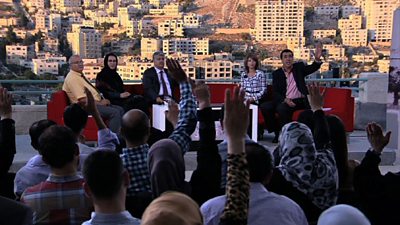Downloads
The Palestinian Debates are two factual debate programmes, one of which is broadcast on the national TV and radio station and the other on national TV and ���˿��� Arabic. They provide Palestinians with the opportunity to question decision-makers face-to-face. ���˿��� Media Action’s research showed that the audience felt positive about the programmes and believed that they play an important role in holding decision-makers to account.
Publication date: June 2014
The Palestinian Debates were launched in September 2012 and are broadcast through both traditional (TV and radio) and social media platforms to fully engage the largest possible audience and encourage audience interaction. Aswat Min Filasteen (Voices from Palestine) is co-produced by the Palestinian Broadcasting Corporation (PBC) and ���˿��� Arabic and airs quarterly. Hur El Kalam (Free to Speak) is produced fortnightly by PBC and broadcast weekly. Each episode has a varied studio audience of about 40 Palestinian adults who have the opportunity to put questions on issues that they believe to be important directly to decision-makers.
Research approach
Building on research from 2012, ���˿��� Media Action conducted a nationally representative survey of 1,500 Palestinians aged 15 and over in September 2013. It measured exposure to and engagement with the Palestinian Debates among audiences in the Palestinian Territories. Data analysis provides insight into audience perceptions of how effectively the programme contributed to accountability. Insights also support ongoing programme development, for example by investigating citizens’ main local and national issues of concern, and tracking media consumption.
Key findings
Overall, audiences report that the programmes provide trustworthy, unbiased and useful information.Social media use is high, and a sizeable minority access the programmes through social media platforms. The majority, however, watch them on Palestine TV, PBC’s television channel.
- The programmes reach more men than women. The proportion of men reached by the programmes is 57%, however men made up only 52% of the total survey sample.
- The programmes reach the target audiences of youth and young adults aged 15 to 34 years.
- 83% of both audiences believe that the programmes improved their understanding of the issues debated. So far these include local elections, immigration, youth, gender issues, education, juvenile and tribal justice, and the peace process, among others.
- Audiences were positive about the programmes overall, with more than 80% of both audiences agreeing that the programmes play a role in holding decision makers to account.
- The Israeli occupation has increased in importance as a national issue of concern for Palestinians in both the West Bank and Gaza since we first surveyed in 2012.
- Palestinians in the West Bank reported more often that they understood the discussion and reports in the programmes, suggesting that the programmes are more relevant in the West Bank than in Gaza.
- There are some regional differences, with fewer audience members in Gaza compared to the West Bank reporting that Palestinian Debates feature people similar to them in discussion and reports.
Project context
The Palestinian Territories present a unique governance context in being overseen by a national authority that has limited control over many issues affecting its population. Parts of the West Bank are politically under the control of the Palestinian Authority (PA), others are mainly under Israeli administration, and the Gaza Strip is under the control of the Islamic Resistance Movement (Hamas). These various degrees of authority and the Israeli occupation play a key role in affecting public dialogue and political participation. Furthermore, Palestinians are barred from freedom of movement and freedom of expression and can face political imprisonment.
Implications and impact
Findings from the data show that the Palestinian Debates are playing an important role in providing a platform for direct engagement between Palestinian citizens and decision-makers. Audiences report that the programmes play a role in holding decision-makers to account, and improve their own understanding of important issues discussed on the programmes. Accountability relies on access to reliable, trusted, and accurate information, and audiences agree that the programmes provide this.
However, the data also shows that issues of concern to the Palestinians have changed somewhat since 2012. Certain issues continue to relate to the context in which Palestinians live; electricity and water are cited as major issues in the Gaza Strip, reflecting the poor provision of government services in this region. Regional differences were also found regarding the programme’s relevance to audiences’ lives.
Regional differences in the issues of concern must be considered in programme topic selection. Increased inclusion of the Gaza strip in programming should ensure that the programmes remain, and are perceived to be, relevant to all audiences. The growth of social media use, and its continued use in programming, provides important opportunities to engage with diverse audiences and provide an additional platform for freedom of expression.
